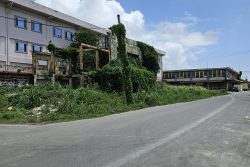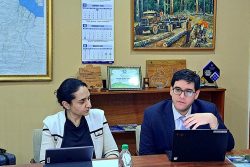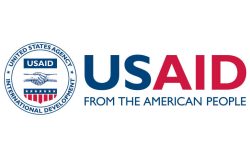Address by Dr. the Hon. Ralph E. Gonsalves Prime Minister of St. Vincent and the Grenadines and Chairman of CARICOM at the Opening of the Twenty-Fifth Inter-Sessional Meeting of the Conference of Heads of Government at Buccament Resorts, St. Vincent and the Grenadines March 10, 2014.
The Caribbean Community (CARICOM) commemorated and celebrated its fortieth anniversary last year. During those forty years, CARICOM has chalked up a wide range of achievements, some of which are impressive, others modest. Of course, there have also been setbacks, disappointments and failures particularly around freedom of movement of persons, good governance and implementation issues. The accomplishments touch and concern functional cooperation, particularly in education, health, and citizenry security; trade and economic integration; freedom of movement of persons though still problematic; the coordination of public policy in the areas of renewable for energy, agriculture and tourism, air transport, financial services, and foreign affairs, and disputes-settlement through the Caribbean Court of Justice (CCJ). Still, there is a great deal left to be done to realise the full fruition of the Revised Treaty of Chaguaramas. It is the frustrating, unfulfilled potential of CARICOM which prompts stinging critiques, including a justifiable sense in some quarters that this regional body is unequally yoked and thus allocates or distributes its benefits too unevenly.
The disillusionment of many of the critics stems, in large measure nevertheless, from their illusions about CARICOM’s nature and its institutional arrangements. So, let us begin by stating what CARICOM is not. CARICOM is not a central government for a bundle of disparate territories. It is not a unitary state; it is not a federation; it is not even a confederation. The Revised Treaty of Chaguaramas conceives it as a community of sovereign states. Its centre has been deliberately designed as a weak superstructure which constantly gropes for consensus. That is what the political market can bear; that is the reality which the broad citizenry in the Community has endorsed. Neither the political leadership as a collective nor the populations as a whole have an appetite for much more than what is currently on offer in the Treaty commitments. So, our political mandate is to ensure that what is fashioned in the Revised Treaty is implemented optimally. To achieve this we must first love and care for CARICOM; secondly, we must ensure that the organs of the Community work as intended and that its decisions are implemented in each nation-state of the Community; and thirdly, that the political leaders and populations in each nation-state possess the requisite political will for CARICOM’s optimal functioning, as structured.
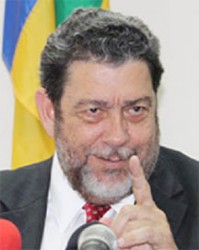
Frequently, CARICOM is lambasted for its failure or refusal to implement the decisions of its treaty-based institutions. Invariably, the CARICOM Secretariat is excoriated for this implementation deficit. However the Secretariat is not CARICOM; it is the central administrative instrument of CARICOM but it possesses no authority to compel enforcement of decisions of the various Councils of Ministers and the Heads of State and Government Conference. In the absence of an Executive CARICOM Commission, buttressed by the requisite constitutional or legal authority, the central responsibility for the implementation of CARICOM’s decisions rests with the governments of the individual nation-states. Thus, each government is enjoined in its responsibility, nay its solemn obligation, to put appropriate institutional arrangements in its natural executive and administrative apparatuses to facilitate the speedy and efficacious implementation of CARICOM’s decisions.
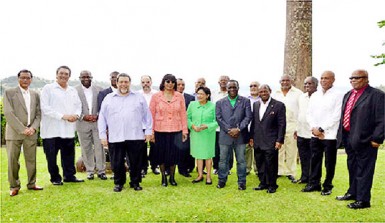
To be sure, the delivery of the Secretariat’s administrative and coordination functions ought to be enhanced, but the implementation deficit has to be put squarely where it belongs ___ at the level of the national governments. Accordingly, vaunted change-drivers cannot reasonably facilitate meaningful change in decision-making and implementation in CARICOM if the individual governments or several of them do not embrace a commitment, made manifest through structured arrangements day-to-day, in the making and implementation of CARICOM’s decisions. So, the success of the CARICOM enterprise truly begins with the political leaderships, though it does not end with us alone. It ends with us, our national populations, and national institutions, massaged by the balm of our regional apparatuses.
This Inter-Sessional Conference of Heads of State and Government has, nominally, a long agenda. Essentially, though, the subjects to be discussed or reviewed for determination have one focus: The improvement in the quality of life and living of the people of our CARICOM region. Our deliberations at this Conference do not take place in an abstract world, but in lived global, regional, and national conditions stuffed with possibilities and limitations. The real world of life, living, and production compel us at his time to reflect centrally on measures for strengthening our regional and national economies including the fortification of the Caribbean Single Market and Economy (CSME); addressing efficaciously the existential challenge of climate change; improving markedly the delivery of air and sea transport; enhancing citizen security; facilitating socio-economic development through ICT; lifting further our region’s human and social development; and coordinating better our region’s foreign and external trade policies, including the settling of negotiating stances for the finalisation of the Canada-CARICOM trade pact.
Other vital issues are up for further consideration, including reparations for native genocide and slavery, the denationalisation of persons of Haitian descent born in the Dominican Republic, and the regional policy regarding medical
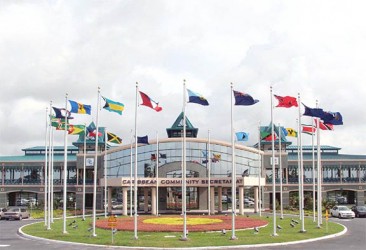
marijuana and the alteration of existing laws on the strict proscription of marijuana’s use for social and religious purposes.
Criss-crossing this bundle of agenda items is the sturdy perennial: The governance, institutional, and administrative arrangements of CARICOM deemed best-suited to achieve CARICOM’s purposes.
I think that we ought to conceive our goals for the successful outcome of this Conference in uplifting, though measured terms. I feel sure that we would make significant progress on several important agenda items. At the same time, we must always bear in mind that leaders effect change for the better in our people’s circumstances only to the extent that those circumstances admit to change. Unrealistic expectations are bound to lead to failure, not merely a perception of failure.
Our esteemed guests to St. Vincent and the Grenadines are in a country which only three months ago was ravaged by an untrackable, unpredictable storm ___ a one in a 100-year weather event! It has caused damage and loss, authoritatively estimated at EC $350 million or some 17 percent of our country’s Gross Domestic Product. Our guests are likely to spend all or most of their time in the southern half of St. Vincent which was spared a direct hit from the worst of the excessive floods and landslides. However, the north-west and north-east of St. Vincent were, and still are, terribly affected. Twelve lives were lost; and people are suffering. In three hours on Christmas Eve 2013, over 12 inches of rain fell in the north of the island. In that three-hour period, the poor became indigent and the vulnerable fell into dire poverty. But we are recovering with the help of our friends regionally and internationally. Our CARICOM partners have shown extraordinary solidarity with us; and we are most thankful.
We in St. Vincent and the Grenadines do not embrace learned helplessness. We are a resilient people. We have been beaten on the anvil of experience and forged in the cauldron of struggle. We are Isaiah people. The Lord and helper of Israel is also the Lord and helper of St. Vincent and the Grenadines. We take His promises to us seriously and we believe Him when He says to us:
“For I am the Lord, your God,
Who takes hold of your right hand
And says to you, Do not fear,
I will help you.”
Our Lord gives strength to the weary and increases the power of the weak. We who hope in the Lord will renew our strength; we will soar on wings like eagles; we will run and not grow weary; we will walk and not be faint.
It is in this spirit that we approach this Conference. I am sure that we will have successful outcomes. Welcome my beloved CARICOM brothers and sisters. We offer, in humility, our hospitality. Most of all, we accord you our sincere love!
Thank you!
